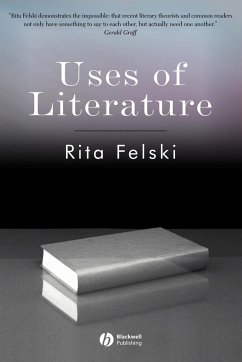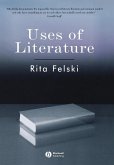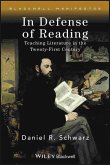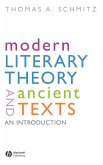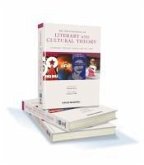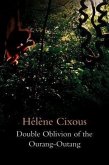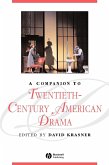The diverse motives and mysteries of why we read are explored in this groundbreaking new work by Rita Felski. Challenging many time-worn homilies and theories put forth in contemporary literary criticism, Uses of Literature offers refreshing new insights into the purpose and value of reading literature.
Proposing that the interaction between reader and literature involves four "modes of textual engagement"--recognition, enchantment, knowledge, and shock--the author bridges the gap between literary theory and common-sense beliefs about literature. Wonderfully original and brimming with valuable insights and provocative ideas, Uses of Literature will change the way you think about why you read.
Proposing that the interaction between reader and literature involves four "modes of textual engagement"--recognition, enchantment, knowledge, and shock--the author bridges the gap between literary theory and common-sense beliefs about literature. Wonderfully original and brimming with valuable insights and provocative ideas, Uses of Literature will change the way you think about why you read.
"Together, Felski's four short essays on recognition, enchantment, knowledge and shock leave me refreshed, invigorated, and willing to engage with my own reading responses both more critically and more charitably. She does achieve her aim, which is to get a better handle on how and why we read. " ( Academic Matters , January 2009)
"Felski finds that it is the structural elitism of the literary critics that has given theory its bad name ... .Felski wants to find an ordinary theory of literature and culture that would replace these hermeneutics of suspicion. Her strategy is to outline a theory of literature based on four modes of human interaction-recognition, enchantment, knowledge and shock. She devotes a chapter to each, marshalling a wide range of texts to illustrate her approach ... .The one on recognition is convincing .. .Felski s manifesto is timely." ( Times Higher Education Supplement , August 2008)
"Felski proposes a pragmatic approach to reading literature. Opposing the exclusive focus on otherness in contemporary literary theory, she offers a correction by balancing otherness with the acknowledgment of the presence of the self in reading literature." ( Choice Reviews , December 2008)
"A spirited defense of literature, full of ideas which promise to prove invigorating for the future development of literary theory. ... An inspired discussion." ( Journal of Literary Theory , 2008)
"Felski finds that it is the structural elitism of the literary critics that has given theory its bad name ... .Felski wants to find an ordinary theory of literature and culture that would replace these hermeneutics of suspicion. Her strategy is to outline a theory of literature based on four modes of human interaction-recognition, enchantment, knowledge and shock. She devotes a chapter to each, marshalling a wide range of texts to illustrate her approach ... .The one on recognition is convincing .. .Felski s manifesto is timely." ( Times Higher Education Supplement , August 2008)
"Felski proposes a pragmatic approach to reading literature. Opposing the exclusive focus on otherness in contemporary literary theory, she offers a correction by balancing otherness with the acknowledgment of the presence of the self in reading literature." ( Choice Reviews , December 2008)
"A spirited defense of literature, full of ideas which promise to prove invigorating for the future development of literary theory. ... An inspired discussion." ( Journal of Literary Theory , 2008)

